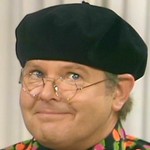
Alfred Hawthorne Hill
(21 January 1924 - 20 April 1992)
Left: Perhaps Benny Hill's most recognizable character, Mr Scuttle, as he appeared in "Fred Scuttle: Thames Television Producer".
Broadcast: March 12, 1975.
Jump to Part One

Left: Perhaps Benny Hill's most recognizable character, Mr Scuttle, as he appeared in "Fred Scuttle: Thames Television Producer".
Broadcast: March 12, 1975.
I had written a tribute to Benny here quite some time ago, but it was brief and not very indepth. I decided that it needed to be revised and I could think of no one more capable than our own William Brown to do the job. He has also used some of the material I had written in the original in this new tribute. I have done the photos you see on these four pages as a Tribute to Benny's mastery of so many characters during his twenty years at Thames Television. Hopefully fans will see this as a fitting Tribute to Benny. For a more indepth look at the characters that Benny did over the years, check out the Faces of Benny Hill Pages.
Pop-Up Gallery | Non Pop-Up Gallery
This gallery includes segues from the Crazy World Of Benny Hill. The photos and text for the gallery were put together by William Brown. In order to accomodate those who do not have Pop-Up Support in their browsers, there are two links for each gallery. The Photos in the gallery are 500 pxels wide by 357 pixels high.
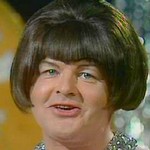
Benny as Mirielle Mathieu in "The European Song Contest".
Broadcast: November 19, 1969.
Among the greats of comedy - Red Skelton, Jack Benny, Danny Kaye, Milton Berle, Jackie Gleason, Lucille Ball, Steve Allen, Jonathan Winters, Carol Burnett, Abbott & Costello, The Marx Brothers, Charlie Chaplin, Laurel & Hardy, "Red Green," the Monty Python troupe, the original cast of the U.S. Saturday Night Live - one name stands out: Benny Hill. The Lad Himself. King Leer. His knack for musical compositions. His facial expressions. His affinity for puns, wordplay and other variants of the English language. His slice-of-life poems. A mixture of comedy and sex which brought many fans as well as detractors. The most successful solo British television comedian, and one of the most successful in the whole world.
This future comic legend was born Alfred Hawthorn Hill in Southampton, England on Jan. 21, 1924 (early biographies and reference books had cited his year of birth as 1925). He had an older brother, Leonard, who later worked as a schoolteacher and, towards the end of his life, penned a biography about his famous brother, Saucy Boy, which was published posthumously in 1990; and a younger sister, Diana, who later became a nurse in Australia, and died in 1984. His family life was not necessarily that close, with his father (called "The Captain") being especially reserved, only in his last years taking pride in his middle child's fame (his father died in 1971, his mother in 1976); the future comic legend sometimes had strained relations with his siblings, with a very long stretch where he had no contact with his older brother whatsoever. He ended up in the service in World War II, and in his younger days also worked various odd jobs as a milkman (which provided particular inspiration for one of his later songs) and drummer (he played in the band of one Ivy Lillywhite whose name he would weave into some of his later sketches). He began performing on stage, inspired by the music-hall comics then in vogue in Britain; in 1947, he renamed himself Benny Hill, in honour of the famous American comedian Jack Benny.
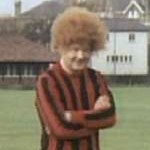
Benny as Ginger Tompkins in "Holiday Sports Spectacular".
Broadcast: December 25, 1969.
Throughout his life, he had a massive stage fright when performing for large audiences, which often adversely affected his theatrical performances. At one point, he was straight man to Reg Varney (a comic actor who would later do much TV, including On the Buses). Also during his travels in those years, he first met an acrobat named Johnny Hutch who would appear in his last two Thames series some four decades later. There was one thing that saved Benny, and to which he ultimately owed his career, and that was television. Early on, he spotted the possibilities of taking full advantage of the medium to create different comic effects - an attribute whose legacy would be buried in later years in light of the controversies about his leering, lascivious persona and "skirt-chasing" formulae. One early routine that would particularly make his name was in 1954, when he was hosting a programme called Showcase. In one episode, he offered a parody of the British TV version of the game show What's My Line? Jeremy Hawk (who would be his straight man on and off through the 1960's) was the "chairman" (host), while Mr. Hill - in changes from role to role, all done live - played the panel members as appeared on the show at the time, Barbara Kelly, Gilbert Harding, Lady Isobel Barnett and David Nixon. The results were hilarious. As a result, he did some live stage shows later in the year, with his aforementioned parody being the highlight - and in one case, he packed 'em in at the same theatre where, just a few short years before, he ignominiously flopped.
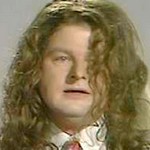
Benny as Tiny Tim in "Benny's Bloopers".
Broadcast: March 11, 1970.
As a result of this buzz, he was first offered his own show, The Benny Hill Show, on the BBC, the first edition of which aired on Jan. 15, 1955. His first series for them featured Beryl Reid as a supporting player and a popular singer of the day named Alma Cogan who provided the musical interludes. His early years on the air bore very little relation to what the shows by which we know him today became; prior to 1961 there were many musical numbers, as the "live" segments of his shows really were live; his shows weren't pre-taped from start to finish until 1964. Beginning in 1957, certain parts of TBHS would be filmed in advance, in the early years confined to in-studio shots of him playing different characters in one scene. The earliest surviving show from his on-and-off BBC run first aired on April 26, 1958, and featured early versions of sketches and routines he would perform in later years, including an interview sketch with a lady showjumper, Fred Scuttle as the head of a "Keep-Fit" class, and the earliest performance of a song he would return to many times in the future, both on TV and on record, "Pepys' Diary." This 1958 show also featured a heavyset, bald bit extra named Jim Tyson who would be associated with TBHS on and off until a few months before his death in 1974. While in later years, Hill was credited as sole writer of the show ("Script and Original Songs by Benny Hill"), from the mid-1950's to the early 1960's he shared writing credit with noted comedy writer (and occasional sketch performer) Dave Freeman. Key members of his cast in the BBC years included Mr. Hawk, actor/singer Peter Vernon, comic actress Patricia Hayes (who would also appear in some of his Thames shows), and Ronnie Brody (who would make one appearance in the Thames years, on Dec. 22, 1971).
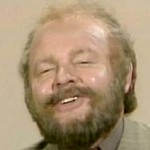
Cinema: Clive Janes features Benny as a Hollywood reporter in "Benny Quickies: Television Secrets".
Broadcast: Feb. 22, 1973.
After his first BBC series, Benny was persuaded to star in a West End (London) revue, Paris by Night, which also featured Tommy Cooper, famous for his fez and "inept" magic tricks. This production featured a bit that he would revisit on his show a couple times over the years, the "Fashion Parade" bit. At first all was well, however as time went on the locals in the audience were replaced by foreign tourists who only cared about the girls on the stage and not one bit about the comedy. While Cooper went on as if nothing happened, such audience response had a profound effect on Hill; not only did it add to his fear of performing before live audiences, it may have been one of several factors leading to the addition of the Hill's Angels in his final decade on the air. As if appearing on stage night after night wasn't enough, he made his feature film debut in a serviceable piece called Who Done It? (not to be confused with the 1942 Abbott & Costello vehicle of the same name). Eighteen months into the play's run, he became thoroughly fed up with it, and convinced its producer, impresario Bernard Delfont, to let him out. Delfont agreed - but as part of the deal, forced Hill, over the next few years (1957-1960), to star in a series of specials for ATV which happened to be run by Delfont's brother, Lew Grade. The first of these specials was produced by Brian Tesler who, as a Thames executive 12 years later, was instrumental in bringing Hill to that company; the last two series (1958-1959 and 1960) were produced by his on-again, off-again producer, Kenneth Carter. During this period, in 1959-1960, he did another London stage show, Fine Fettle, based on a French production called La Plume de Ma Tante. This show, like the previous one, offered bits he would later revisit on his TV shows, including a bit where he and another stable boy are tending to Lady Godiva's horse on the day she is to set off on her famous ride through Coventry; a takeoff of This Is Your Life, where Benny plays several characters reminiscing about the subject, played by veteran British character actor Robertson Hare (who would reprise his role in a version of this parody which aired on Hill's second show for Thames on Dec. 25, 1969); spoofs of cinema advertisements; and the Lower Tidmarsh Volunteer Fire Brigade Glee Singers. This production also started out well but later faltered; the combined effects of this and the previous stage show further amplified Hill's stage fright in front of large audiences. As the years went on, he sought to reduce his contact with the studio audiences who attended live tapings of his shows to a bare minimum. After Fine Fettle ended, he made another film, Light Up the Sky, which also co-starred the likes of Ian Carmichael (who would play "Lord Peter Wimsey" on TV in the 1970's) and Tommy Steele (a popular British singer of the time).
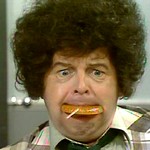
Benny as Stavros in "Kojak" from the
"Jack & Jill: Variations on a Theme"
Broadcast: Dec. 17, 1975.
Benny also made recordings of his various ditties. His career in that field really began in earnest in 1961 on the Pye label with three singles - "Gather In The Mushrooms" / "Pepys' Diary," "Transistor Radio" / "Gypsy Rock" and "The Piccolo Song" / "Lonely Boy." (Only the last two would not be sung in any form on his Thames programmes; he did a song called "Lonely Boy" in his 1975 Tex Cymbal sketch, but it wasn't the same song.) Another single, "The Harvest of Love" / "BAMba 3688," followed in 1963. In 1965, he recorded and released an album, Benny Hill Sings?, most of whose contents would pop up in many Hill shows over the years. One track on this album, "Those Days," a takeoff on the music of Sonny & Cher, featured as his duet partner, a session backing singer named Maggie Stredder; four years after this album, her group, The Ladybirds, would become the vocal backing group for his show upon his move to Thames. ("The Harvest of Love" was also issued in the U.S. on the Rust label, where it vanished with nary a trace.) His producer and musical director at Pye was one Tony Hatch, a few years before his collaborations with Petula Clark transformed her into an international superstar; Hill would frequently impersonate the diminutive Hatch in later years.
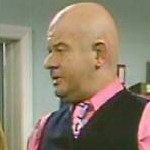
Benny as Kojak in "Kojak" from the
"Jack & Jill: Variations on a Theme"
Broadcast: Dec. 17, 1975.
Benny was a world traveler, with favorite spots being in and around France as well as Spain. He often boasted about "getting slapped around in six different languages," though according to some sources he was fluent in four of them (not only French, but also German, Dutch and Italian). Often his travels proved inspirations for comic material. He also had a particular affinity for exotic foreign music acts. Over the years, he had such music groups as Luis Alberto del Parana and Los Paraguayos and Los Zafiros on his show - and, pre-1968, a "Spanish" act that was actually British in origin, Dorita y Pepe. He also worked to learn different instruments, at one point affixed on the Paraguayan harp.
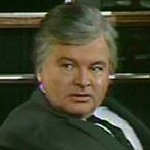
Benny as "Ironside" in "Murder On The Oregon Express".
Broadcast: March 24, 1976.
Benny lived alone and never married. In 1960, he moved into a flat at Queen's Gate, London, which would be his home for the next 26 years. In relationships with women, he never had much luck. He proposed a couple of times in his life, but struck out every time. He did have special relationships, however, with two disabled women, Phoebe King and Jeanette "Netta" Warner. Not even his closest friends and associates knew of these relationships for years. He snuck in their names in the mock album cover of "For Ever Love" in the April 8, 1985 sketch of the same name, among the other artists' names (mostly pun-based) on the left-hand corner of the cover.
Continue on to Part Two